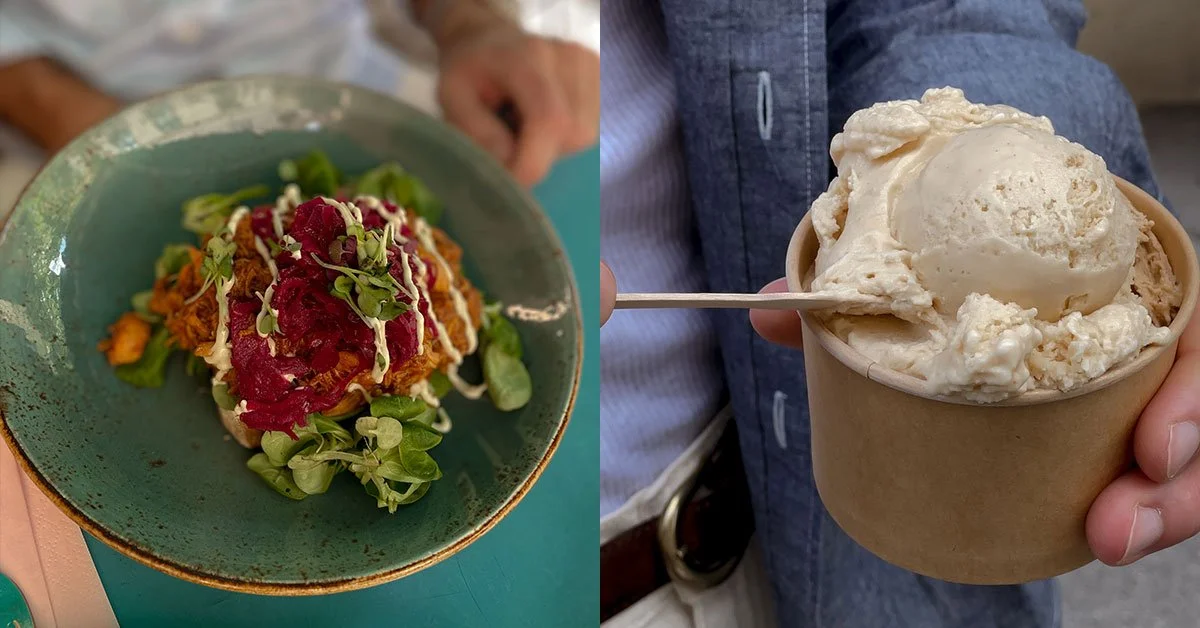My take on nutrition, supplements and what I eat in a day
How food fuels performance and well-being
I view food as fuel for my body because it affects our performance in everyday tasks and sports, as well as how we feel physically and mentally. Food is fundamental to how we feel. If you mostly eat processed foods that are very high in calories, you will mostly feel like crap. This is because processed foods often have high levels of fat, which is harder to digest. That’s why you always feel more tired after eating a meal high in fats. On the other hand, eating nutritious food gives you more energy for all your activities and helps you feel better, making you more productive and energetic. You feel stronger, have better clarity, improved self-esteem, better sleep, and reduced stress. So my advice is: if you want to be more productive and stick to your plans, start eating more nutritious food.
By eating more whole foods you increase your food volume, which leads to greater satiety. So if you plan your meals correctly, you can eat larger portions and feel fuller while consuming fewer calories compared to processed foods.
You can't out-train a bad diet. Even with a solid training plan and training hard you won’t achieve the results you want without proper nutrition. You can only burn a limited number of calories during training, often less than you might think. So it’s crucial to determine your baseline calories to maintain your weight and have a reference for gaining or losing weight. For optimal results, your body also needs all essential nutrients, which is why having variety in your diet is very important.
You probably need to consume more protein as well. I will tell you why:
Protein helps reduce hunger by lowering the hunger hormone ghrelin and increasing the fullness hormone peptide YY. It also benefits your bones by helping maintain bone mass and reducing the risk of osteoporosis and fractures.
Eating more protein can help lower blood pressure, which reduces the risk of heart attacks, strokes, and kidney problems.
Protein helps build and maintain muscle. If you lift weights or work out regularly, getting enough protein is important for muscle growth and strength.
A high-protein diet can help you maintain weight loss by boosting your metabolism and reducing cravings, often leading to quicker weight loss.
Eating more protein helps maintain muscle strength as you age, reducing the risk of frailty, bone fractures and poor quality of life. That's why it's important to stay active as you age. Weight lifting or resistance exercises can do wonders.
If you aren’t currently tracking or measuring your protein intake, I suggest you start doing so because you likely aren’t meeting your daily needs. Start with 1.5 grams per kilogram of your body weight and work it up to 2 grams or even 2.5 grams per kilogram for best results.
I know most people don’t track calories at all and many don’t even understand what calories are. Understanding calories and how to calculate them is one of the most useful things you can do for your overall well-being. If you learn this and apply it for a few months, you will gain a much better understanding of food and make better choices when eating out. You’ll be able to generally estimate the macros and calories of different foods and knowing about calories will help you recognise which meals and types of food are higher in calories, leading to better decisions.
My nutrition - what I eat in a day
Disclaimer: This nutrition plan works best for me and my lifestyle based on my training and daily activities. Feel free to use my meals as inspiration. I advise learning how to calculate your base calories to find what works best for you.
My nutrition is on point 90-95% of time. I am not a fan of what some people call cheat meals. These people usually stay on a strict diet but then go completely off the plan for a meal or even a full day, consuming more calories in that time than they typically do in a day or two. This is not productive and also not health in my opinion. I see it as some form of eating disorder. I suggest creating a meal plan that you truly enjoy if you want to stay consistent and on track. I plan and prepare most of my meals, usually doing my "meal prep" for three days at a time. This means I take time to prepare all my food for that day and the next two days. For the remaining 5-10% of the time I go off my strict plan and eat what I call “soul food”. This is food that I enjoy but know is not beneficial to eat every single day. I don’t see it as a reward, I am not an animal. I see it as something that I truly enjoy and makes me happy. Usually these are meals I share with my family or friends.
Supplements
There is no magic pill to help you reach your fitness goals or improve your well-being if you don’t have your nutrition in order, manage your stress and get enough sleep. Once you have these main elements sorted, there are a few things that can support them.
The first is whey protein, which is the easiest natural way to increase your daily protein intake if you can’t get enough from food.
The second is creatine monohydrate. Creatine is one of the most well-studied sports supplements and has consistently been proven to offer many benefits:
Increased muscle strength and power: makes you stronger and more powerful in intense activities.
Enhanced muscle mass: helps your muscles grow by improving exercise results and recovery.
Improved exercise performance: boosts performance in short, intense workouts.
Faster recovery: speeds up recovery by reducing muscle damage after intense exercise.
Enhanced brain function: may improve mental performance, especially when tired.
Support for brain health: could protect brain cells and support brain health.
Potential bone health benefits: might help maintain bone density and support bone health.
Better blood sugar control: may improve blood sugar levels, which helps with diabetes management.
Reduced fatigue and more energy: boosts energy and reduces fatigue during exercise and daily activities.
Improved muscle endurance: helps you endure longer during repeated intense activities.
Another supplement is Omega-3 fish oil capsules. Omega-3s offer several proven benefits, including improved heart health, reduced inflammation, enhanced brain function, better eye and joint health, healthier skin and support for mental health, bone health and weight management.
The last supplements I take daily are electrolytes. They are vital for staying hydrated, supporting muscle and nerve function, maintaining heart health and regulating fluid balance and blood pressure.
Other proven supplements include vitamins. If you think you’re not getting enough vitamins, you can take them in supplement form. Blood tests can show if you need them. Lastly, I will mention caffeine. It can provide energy, concentration or focus boost for work or training. I personally don’t consume caffeine because I don’t experience the benefits, it only seems to make me need the bathroom.
And now, finally, here’s an example of what I eat on most days. My main goal is to have sufficient daily protein intake and to distribute protein evenly across all my main meals.
Pre-workout meal (40g protein, 110g carbs, 10g fats)
I start my day with a pre-workout meal. I wake up at 5:30 every morning and usually have my pre-workout meal at 5:45 so I can be at the gym, warmed up and ready to train around 6:45, which is an hour after I consume the meal. I have three options for my pre-workout meal, all of which start with a protein shake: one scoop of whey protein mixed with water, plus a daily dose of creatine monohydrate.
Option 1: 2 semmels (which are similar to white bread rolls), with peanut butter, banana and honey.
Option 2: 4 white toasts with peanut butter and jam.
Option 3: corn flakes with low-fat milk.
The point of the pre-workout meal is to provide some protein and simple carbs for fast digestion to fuel my training. I try to stay away from fats but add just a little bit of peanut butter for flavour.
Post-workout meal or breakfast (40g protein, 120g carbs, 10g fats)
Another protein shake one scoop of protein whey, mixed with water. A portion of fresh seasonal fruit and corn flakes with low fat milk. The point of post-workout meal is to get some protein and simple carbs for quick digestion to restore energy after training. I try to stay away from fats for faster digestion.
A snack - (25g carbs - 100kcal)
Usually, my snacks during work hours are just carbs, such as another serving of fresh fruit, Salzstangen/Pretzels or sometimes some candy.
Lunch - (70g protein, 150g carbs, 20g fats)
I always have a big portion of animal-based protein, along with a large serving of carbs and veggies. My lunch is usually low in fats and includes turkey, chicken or beef. I typically eat fish only on weekends because it takes more time to prepare and isn’t my favourite for meal prep. For meal prep, I usually make rice or quinoa with veggies, some sauce and meat.
Afternoon snack - (25g carbs - 100kcal)
My afternoon snack, which is also a small pre-workout for my evening run, is just carbs. This could be more fresh fruit, Salzstangen/Pretzels, or sometimes some candy.
Dinner (60g protein, 80g carbs, 40g fats)
I usually try to eat my dinner or last meal 1.5-2 hours before going to sleep. I always have the same dinner: oats with low-fat magertopfen (a fat-free type of cheese or curd) and a little low-fat milk, mixed with vanilla drops and cinnamon. I finish it with 50 grams of roasted peanuts. I leave most of my daily fat intake for the late evening. Eating fats before sleep can help you feel fuller, support hormone production, provide steady energy, enhance nutrient absorption, stabilise blood sugar, aid muscle recovery and potentially improve sleep quality.
So my average daily food intake usually looks like this: 210g protein, 510g carbs, 80g fats - 3600kcal.
This is how and what I usually eat. If I want to lose a little body weight, I reduce my calories by around 10% and if I want to gain some mass, I usually increase my calories by around 10%.
I would love to hear if this article helped you in any way or if you have any further questions about this topic.




